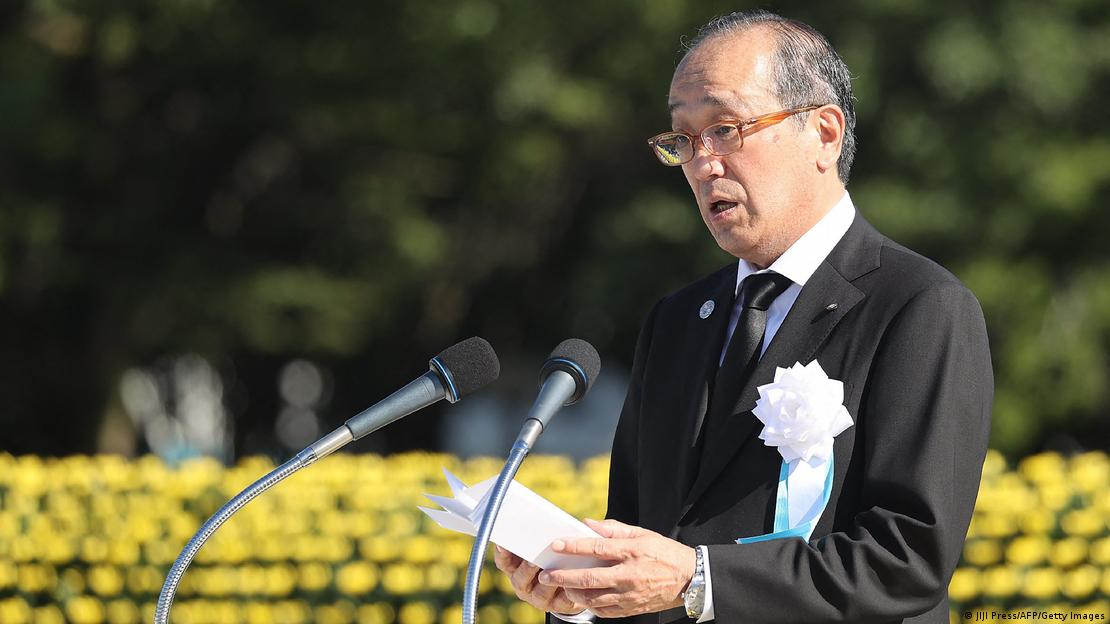Japan on Sunday commemorated the 78th anniversary of the atomic bombing of Hiroshima in the final phase of World War II.
Considering the growing nuclear threat worldwide, the mayor of Hiroshima Kazumi Matsui called for the abolition of nuclear weapons and described the nuclear deterrence policy of G7 as "folly."
"They must immediately take concrete steps to move us from the dangerous present to our ideal world," he said as a peace bell rang on Sunday at 8:15 a.m. — exactly when on August 6, 1945, US bomber Enola Gay set off the world's first atomic bomb dropped on a population center.
This year, the G7 summit took place in Hiroshima, which happens to be Japan Prime Minister Fumio Kishida's home constituency

"Leaders around the world must confront the reality that nuclear threats now being voiced by certain policymakers reveal the folly of nuclear deterrence theory," Hiroshima Mayor Kazumi Matsui said at the ceremony which was also attended by Kishida.
At the memorial ceremony about 50,000 people, including aging victims who survived the bombing, gathered and observed a moment of silence.
Drums of nuclear war beating again: Antonio Guterres
The anniversary of the Hiroshima bombing was commemorated amid the growing threat of nuclear weapons propelled by Russia's invasion of Ukraine.
The issue poses a tricky balancing act for Kishida. Japan is traditionally an advocate of nuclear disarmament, in no small part because of the legacy of the attacks on Hiroshima and then Nagasaki three days later.
However, it also supports the partly nuclear-armed G7's group stance that members with atomic weapons shall retain them for as long as they're a necessary deterrent against other nuclear powers.
"World leaders have visited this city, seen its monuments, spoken with its brave survivors, and emerged emboldened to take up the cause of nuclear disarmament," he said in remarks read by a UN representative. "More should do so, because the drums of nuclear war are beating once again."
 The American atomic bomb which was dropped on Hiroshima was nicknamed "Little Boy." It is thought to have killed as many as 140,000 people by the end of 1945. Three days later, the US dropped a second bomb on Nagasaki. It is believed to have killed up to 70,000 over the next four months.
The American atomic bomb which was dropped on Hiroshima was nicknamed "Little Boy." It is thought to have killed as many as 140,000 people by the end of 1945. Three days later, the US dropped a second bomb on Nagasaki. It is believed to have killed up to 70,000 over the next four months.
A few days after the bombings, on August 15, Japan made an official announcement that it was surrendering. Soon after, on September 2, Japan formally capitulated, bringing an end to World War II in Asia.
Whether using the bombs brought about a speedier, and possibly even more bloodless, end to the war or whether it was an ultimately unnecessary show of force remains a fierce debate among historians almost eight decades on
They went for very military industrial complex cities as possible. There was no purely miltrry target big enough. But is it worse than the fire/bombing that went on against many cities in the war (e.g. Dresden, Tokyo, Coventry, London west end and mamy many more.)
Big enough for what though? Big enough to take advantage of the amount of destruction these weapons create? They could have chosen a single isolated, near coast warship. Or even just dropped it near coast on no target at all. The important thing would have been the show of force, in order to deter further attack. Knowing the US had that capability might have been enough to end the war. But we didn't try to communicate that we had these weapons, instead we used them.
We baleeted 2 cities to prove there was literally 0 point in fighting, we could eliminate Tokyo, remove it from the earth at will.
They still wanted to keep fighting.
I think you're applying a level of rationality to them that was not there, even after the war, there are testimonies from Japanese leaders where they simply did not believe they could lose because they were destined to win under heaven.
They knew Americans couldn't take the islands, they were too squeamish and couldn't stand to lose that much blood, so Japan would remain no matter what.
Removing cities finally convinced them they were completely outclassed and there was no point even trying to fight.
The problem is this is an argument of what ifs. Who knows if Japan would have reconsidered if the US had performed a public demonstration, or even just made the trinity test public before dropping Hiroshima, so the Japanese knew what was coming if they didn't surrender. Maybe it would have done something, maybe it wouldn't. We'll never know for sure, and all this arguing about the collective psychology of a large nation 100 years ago is never going to reach a point of agreement.
We know what they were thinking even after we ctrl-x'd 2 cities, they were going to fight on and there was an attempted coup to do so.
After the first bomb they had experts swear America couldn't have any more than 1 bomb.